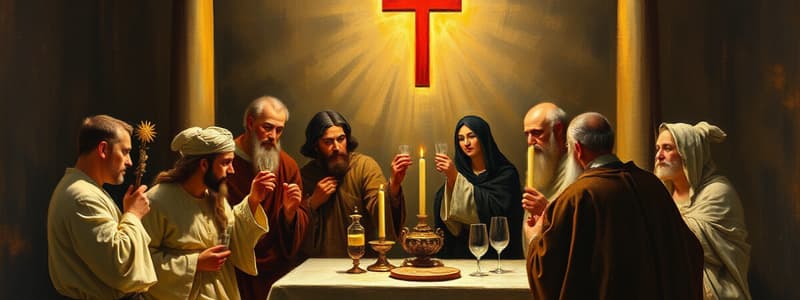Podcast
Questions and Answers
What is the Church's official, public, communal prayer?
What is the Church's official, public, communal prayer?
- Council
- Eucharist
- Liturgy (correct)
- Prayer meeting
What is the Magisterium?
What is the Magisterium?
The Church's living teaching office that interprets and preserves the truths revealed in Scripture and Tradition.
What does Tradition mean?
What does Tradition mean?
It comes from the Latin word meaning 'to hand on or give over.'
What is the Trinity?
What is the Trinity?
What is the Liturgical Year?
What is the Liturgical Year?
When does the Liturgical Year begin?
When does the Liturgical Year begin?
What does the Christmas season in the Liturgical Year commemorate?
What does the Christmas season in the Liturgical Year commemorate?
How does Ordinary Time occur in the Liturgical calendar?
How does Ordinary Time occur in the Liturgical calendar?
When does Lent begin?
When does Lent begin?
What do we remember during the Easter Triduum?
What do we remember during the Easter Triduum?
What does Easter Sunday mark?
What does Easter Sunday mark?
What is transubstantiation?
What is transubstantiation?
What is Baptism?
What is Baptism?
Flashcards
Liturgy
Liturgy
The Church's official, public, communal prayer.
Magisterium
Magisterium
The Church's teaching office that interprets Scripture and Tradition's truths.
Tradition
Tradition
From Latin meaning 'to hand on or give over.'
Trinity
Trinity
Signup and view all the flashcards
Liturgical Year
Liturgical Year
Signup and view all the flashcards
Advent
Advent
Signup and view all the flashcards
Christmas Season
Christmas Season
Signup and view all the flashcards
Ordinary Time
Ordinary Time
Signup and view all the flashcards
Lent
Lent
Signup and view all the flashcards
Easter Triduum
Easter Triduum
Signup and view all the flashcards
Easter Sunday
Easter Sunday
Signup and view all the flashcards
Transubstantiation
Transubstantiation
Signup and view all the flashcards
Baptism
Baptism
Signup and view all the flashcards
Study Notes
Sacraments and God's Grace: Key Terms and Concepts
-
Liturgy: The Church's official, public, communal prayer structure encompassing various forms of worship and rites.
-
Magisterium: The Church's authoritative teaching body tasked with interpreting and safeguarding the truths found in Scripture and Tradition.
-
Tradition: Derived from Latin meaning "to hand on," it signifies the transmission of the Gospel message across generations within the Church.
-
Trinity: Central Christian doctrine that defines God as one essence existing in three distinct Persons: the Father, the Son, and the Holy Spirit.
-
Liturgical Year: The Church’s cyclical calendar featuring a series of feasts and seasons, celebrating key events and mysteries of Christ’s life and mission.
-
Advent: Marks the beginning of the Liturgical Year, focusing on the preparation for Christmas and the coming of Christ.
-
Christmas: A significant season within the Liturgical Year, starting on December 25 and concluding with the Solemnity of the Baptism of the Lord.
-
Ordinary Time: A period observed twice within the liturgical calendar, occurring between the Christmas season and Lent, as well as between Pentecost and Advent.
-
Lent: A solemn and reflective season starting on Ash Wednesday, leading up to Easter, emphasizing penance and preparation.
-
Easter Triduum: The sacred three-day observance at the end of Holy Week, focusing on the passion, death, and resurrection of Jesus Christ.
-
Easter: A joyous season commencing on Easter Sunday, celebrating the resurrection of Christ, central to Christian faith.
-
Transubstantiation: The theological concept explaining the transformation of bread and wine into the genuine Body and Blood of Christ during the Eucharist.
-
Baptism: The first of the Seven Sacraments, serving as a vital initiation into Christian faith and practice.
Studying That Suits You
Use AI to generate personalized quizzes and flashcards to suit your learning preferences.



